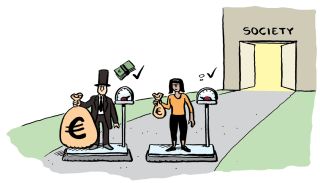Many of Ireland's richest pay lower tax rates than ordinary working people

Yesterday, the Irish Times reported that more than 80 of the country’s richest taxpayers declared taxable income less than the average industrial wage in 2015. This was based on a study by the Comptroller and Auditor General (C&AG) which covered the taxation of more than 300 of the country’s richest people.
"High-net worth individuals" are defined by Revenue as those with over €50 million in assets, but there is huge variation in the income tax paid by the 334 people who fall within this group, according to the C&AG report. In 2015 this group paid a total of €473 million in income tax. However a mere 10 ten taxpayers from the group were responsible for 85 per cent of this tax bill, meaning that many of the rest paid very little income tax.
As reported by the Irish Time, the C&AG report noted:
- that 140 high net worth individuals, or 42 per cent of the total, had taxable income of less than €125,000.
- that of these 140, 83 had taxable income of less than the average industrial wage - just over €36,500.
- that 90 taxpayers in the group paid income tax at a lower rate than the average taxpayer.
Such statistics serve to highlight again a number of inadequacies in the Irish tax system, with so many of Ireland’s highest earners either not obliged to declare much of their income for tax in Ireland, or using tax credits and reliefs to drastically reduce their tax bill.
When high earners and high net worth individuals do not pay their fair share in tax, the burden falls harder on low-to-middle earners. When the effective rates of tax for these individuals is as low as noted above, this creates an especially unfair situation. Tax avoidance on a grand scale leads to the increased underfunding of the public services and social infrastructure that most ordinary Irish people rely on to underpin their standard of living. Wealthy individuals are often in a position to use a range of reliefs and credits to reduce their tax bill, as well as availing of capital allowances, loss reliefs, and mechanisms to move money overseas and out of the reach of Revenue. When this happens, the money required to run Ireland's public services must come from other sources.
Social Justice Ireland has made a number of policy proposals that would help ensure that those who benefit most from our economic system contribute a fairer share. These include:
- an increase from 30% to 35% in the minimum effective tax rate of those earning more than €400,000 per annum;
- abolishing the Special Assignee Relief Programme (SARP);
- reducing the tax expenditure on private pension contributions, the majority of which is appropriated by higher earners.
Government should also bring in a rule that:
- all tax breaks, reliefs and expenditures must have a sunset clause from the outset, meaning a provision should be made that the tax break will automatically be terminated after a fixed period unless extended by law. A strong justifiable reason should be presented to the Dáil for extending any such breaks;
- all tax breaks, reliefs and expenditures should be fully costed so that members of the Oireachtas and the public can see what they cost the Exchequer and make a judgement on their cost-effectiveness and desirability.
More of Social Justice Ireland's tax-based proposals for a fairer Ireland can be viewed in our publications Budget Choices 2019 and Fairness and Changing Income Taxes.